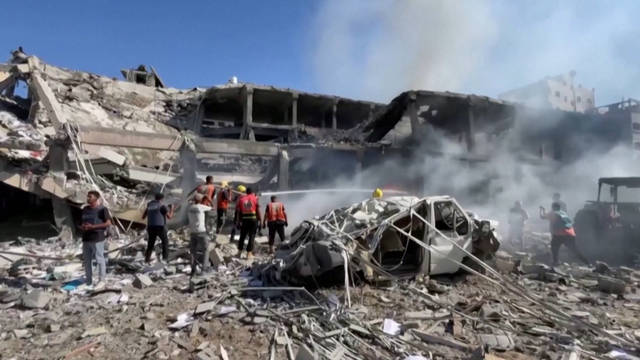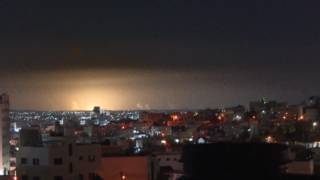
By Amy Goodman & Denis Moynihan
Renowned dissident Noam Chomsky wrote in “Fateful Triangle,” his seminal book on Israel/Palestine, “For some time, I’ve been compelled to arrange speaking engagements long in advance. Sometimes a title is requested for a talk scheduled several years ahead. There is, I’ve found, one title that always works: ‘The current crisis in the Middle East.’ One can’t predict exactly what the crisis will be far down the road, but that there will be one is a fairly safe prediction.”
While Noam at 95 has left public life, his words from 35 years ago ring chillingly true today. Only now, Israel, backed by the United States, is fanning the flames of what could quickly become a much wider war.
One year after Hamas’s attack on Israel, the bombardment, military assault and intense siege of the Gaza Strip continues. The October 7th death toll in Israel included over 1,100 people, while the official death toll in Gaza since then is close to 42,000 (a number many observers consider a gross undercount), climbing daily with ongoing attacks on schools, residential buildings and displacement camps. Reporting on the continued slaughter in Gaza is largely overlooked now, with global attention focused on Lebanon.
On one day in Gaza this week, Israel killed over 100 people, with 51 in Khan Younis alone, including 12 children. Gaza’s media office told the Turkish Anadolu Agency that, since last October, Israel has eliminated “902 Palestinian families, erasing them from the civil registry by killing all their members,” and has “exterminated 1,364 Palestinian families by killing all their members, leaving only one individual per family, and…3,472 Palestinian families, leaving just two individuals per family.” An earlier Israeli strike reportedly hit an orphanage. But in a conflict that has created the term, “WCNSF,” for “Wounded Child, No Surviving Family,” perhaps the entire Gaza Strip should be considered an orphanage.
Meanwhile, in Lebanon, Israel has begun its ground incursion and stepped up the intensity and range of its aerial assault. This follows its assassination last week of Hezbollah leader Hassan Nasrallah, and the massive exploding pager and walkie-talkie attack in Lebanon, which killed over 35 people and injured more than 3,500.
Lebanese authorities estimate that the number of displaced has now risen to 1.2 million people, in a nation of 5.8 million. As of Thursday, according to NBC, Lebanese health officials reported 1,300 people in Lebanon had been killed by Israeli military action. Israel, meanwhile, reported eight of its soldiers had been killed in southern Lebanon.
In response to the assassination of Nasrallah, Iran launched an estimated 180 ballistic missiles at military targets in Israel, with little damage reported.
“We were left with no choice but to respond. If Israel decides to retaliate, then it will face harsher reactions,” Iran’s new president, Masoud Pezeshkian, said, following the attack.
Former Israeli Prime Minister Naftali Bennett told CNN,“Now is the time that we can attack, because Iran is fully vulnerable. The Islamic Republic of Iran, it’s time to hit.”
Lebanese attorney Nadim Houry has simple advice for Israel:
“Don’t do it.”
Houry, executive director of the Arab Reform Initiative, spoke from Paris on the Democracy Now! news hour: “Don’t do it. You will fail. You’ve failed in the past. We know that there is another pathway. There are two central questions that as long as they’re not resolved, the Middle East is not going to know peace. The first one is the Palestine question. And the second one has been central to the region since 1979, which is: What is the legitimate place of Iran…if the region is to know proper peace, we need to answer these two questions.”
Nadim Houry points to the U.S. invasion of Iraq in 2003, and the U.S./Israeli claim that the occupation of Iraq would ultimately hurt Iran and reshape the Middle East:
“At the time, I remember a younger Netanyahu telling the Americans in Congress, ‘It’s all going to be fine. Iran is going to lose. We’re going to have democracy. Everyone is going to welcome us.’ Well, guess what: It didn’t turn out exactly the same way. Yes, the U.S. had overwhelming power. Yes, the U.S. invaded and occupied Iraq. And the occupation was a disaster. And today, Iran is stronger than it ever was.”
Last week, the Islamic Resistance in Iraq attacked Eilat, the southern Israeli city on the Red Sea, with a drone. Yemen’s Iranian-backed Houthis fired missiles and drones at Israel. Israel bombed Yemen in retaliation. Hamas remains active, and Hezbollah is fighting where it is strongest, on its own terrain.
Israel cannot bomb its way to peace, and certainly shouldn’t be allowed to do so with U.S. arms and ammunition. The time is long past for ceasefire and negotiation.











Media Options